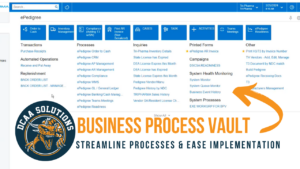In today’s rapidly evolving business landscape, data is the most valuable intellectual property a company owns! ERP systems fail when the data is wrong. Digital transformations are the processes to getting the data right and creating new undiscovered revenue streams, or cost cutting measures. Effective data management is crucial for success.
In this blog post, we’ll delve into why data management is so important and how it impacts various aspects of modern business operations.
1. Understanding Data
Data refers to the raw information collected and stored by organizations. This includes customer details, sales figures, inventory levels, and much more. In the context of ERP systems, AI, and digital transformations, data encompasses both structured (databases, spreadsheets) and unstructured (emails, social media posts) data.
2. The Challenge of Data Management
Managing data effectively is no easy task. Organizations face challenges such as data silos, inconsistent data formats, data security concerns, and the sheer volume of data generated daily. Without proper management strategies in place, data can become a hindrance rather than an asset.
3. Best Practices for Data Management
To overcome data management challenges, organizations must implement best practices such as data governance frameworks, data quality assurance processes, data integration techniques, and robust data security measures. It’s essential to have a clear data management strategy aligned with business objectives.
4. DCAA Solutions’ Approach to Data Management
At DCAA Solutions, we understand the importance of effective data management in ERP systems and digital transformations. Our approach includes:
- Data Governance: Establishing policies and procedures for data management, ensuring data accuracy, integrity, and security.
- Data Integration: Connecting disparate data sources within an organization to provide a unified view of data.
- Data Quality Assurance: Regularly monitoring and improving data quality to enhance decision-making processes.
- Data Security: Implementing robust security measures to protect sensitive data from breaches and cyber threats.
5. Testing Data Management Processes
Before going live with an ERP system, thorough testing of data management processes is essential. This includes data validation, data migration testing, performance testing, and user acceptance testing to ensure data accuracy and system reliability.
6. Considerations for Going Live
When transitioning to live operations, organizations must carefully plan for data migration, user training, and ongoing data management. It’s crucial to monitor system performance, address any issues promptly, and continue refining data management practices for long-term success.
In conclusion, data management plays a pivotal role in the success of ERP systems, AI implementations, and digital transformations. By adopting best practices, leveraging advanced technologies, organizations can harness the power of data to drive innovation, efficiency, and growth.



